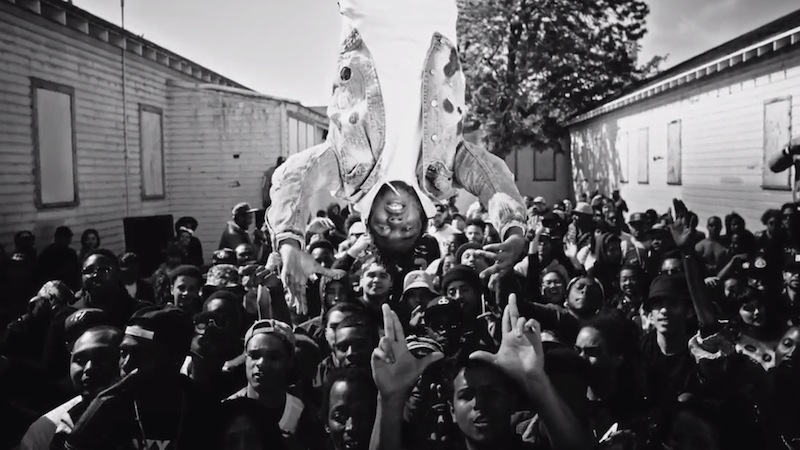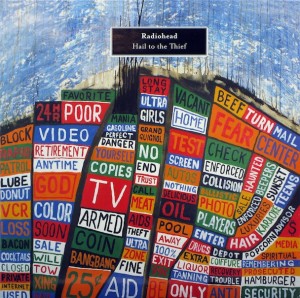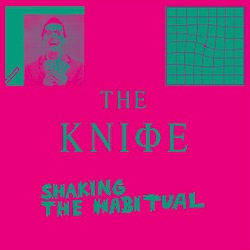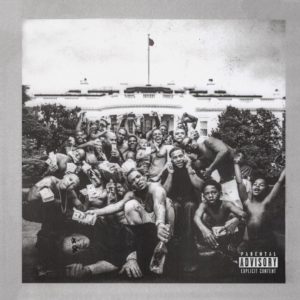10 Essential 21st Century Political Albums

Back in 2012, just before the presidential election, we published a list of 10 Essential Political Albums. And though most of those were released in the 20th Century, between the Kennedy and Bill Clinton administrations, the socio-political commentary of the albums we chose still ring true today. Yet since the turn of the century, particularly after September 11th and the Iraq War, there’s been a much louder cry for change from musicians, which has grown and evolved into a musical climate today that’s rife with artists addressing some of the societal ills of today. Just this year alone, there’s been an impressive lineup of albums with important issues at their core: Pill’s new album Convenience tackles everything from apathy to gender equality, ANOHNI’s Hopelessness made pop hits out of drone strikes and global warming, and Exploded View’s self-titled debut (fronted by former journalist Anika) puts post-punk beats to indictments of gentrification and privilege-blind protestors. Those are just a handful of highlights in politically charged music of the past year, but we put together a list of 10 of the best 21st Century Political Albums as the election cycle drags on and grows more absurd by the minute.
 Sleater-Kinney – One Beat
Sleater-Kinney – One Beat
(2002; Kill Rock Stars)
To the extent that political issues are those that affect people on a personal level—such as gender or sexual empowerment and rights—Sleater-Kinney have always been a political band on a certain level. But the personal and political combined in a much more intimate way on 2002’s One Beat, where on second track “Far Away,” Corin Tucker is very literally watching the September 11th terrorist attacks on TV while she nurses her newborn child. It’s not until the psychedelic military march of “Combat Rock” that One Beat turns from subtle or personal reflection to a less than subtle indictment of the Bush administration’s calls for war and reissued jingoism (with a divine chorus at that). What makes One Beat one of the great political albums of our time, however, is that it’s about hope instead of despair or white-hot rage (though those are certainly bubbling just underneath the surface). As Tucker sings in brassy standout “Step Aside,” “These times are troubled these times are rough/ There’s more to come but you can’t give up/Why don’t you shake a tail for peace and love.” You heard her—start shaking. – JT
 Radiohead – Hail to the Thief
Radiohead – Hail to the Thief
(2003; Capitol)
Even the Brits were concerned with American politics as the 21st century began to take shape. The Bush era was the grandiose yet brief culmination of American apathy and xenophobia, and no other band captured the kind of externally-focused paranoia that dominated the television and media outlets at the time. Hail to the Thief, Radiohead’s mid-career redirect back into something resembling rock music, took the schizoid neuroses of their two previous and spat them back outward with renewed venom. The Orwellian nudges and climate change references might be seen as a touch blunt or garish: “I’ll stay home forever / where two and two always makes a five” seems like a callous characterization of the typical American, and the lyrics “The dinosaurs roam the Earth / The sky turns green,” seem more foreboding than artful. But elsewhere, the band exudes an ambience of maturity and poignant regret for the state of the world’s political affairs. When Yorke laments on “Sail to the Moon” (a track dedicated to his son) that, “Maybe you’ll be president / But know right from wrong,” you get the sense that this bureaucratic “nonsense” affects every individual on a profound level. – JM
 Nine Inch Nails – Year Zero
Nine Inch Nails – Year Zero
(2007; Interscope)
Industrial music has always been an antiestablishment genre yet through the mid-2000s its standard-bearer, Nine Inch Nails, was only used by Trent Reznor to work out personal demons of loss, addiction and betrayal. After testing the waters with “The Hand That Feeds,” a middle finger to George W. Bush from 2005’s With Teeth, Reznor expanded his worldview to a full LP. Supported by a groundbreaking alternate reality game with clandestine events and secret communications, Year Zero explores the sociopolitical realities—and a few sci-fi surrealities—of America to come in 2022. It skillfully ties together many storytelling POVs, reasonable fears (like hypermilitarization and climate change), and strong Reznorisms across the stomping pop of “Survivalism,” the atmospheric “The Greater Good,” and the chaos of “Meet Your Master.” If Reznor’s words and albums are sometimes reductively critiqued as angsty poetry from high school notebooks, Year Zero uses that despair as fuel to launch through the ether of the college lit mag, the master’s thesis, and the movie-optioned buzz-bin first novel. – AB
 Killer Mike – R.A.P. Music
Killer Mike – R.A.P. Music
(2012; Williams Street)
While his wildfire raps on Run The Jewels 2 introduced Killer Mike to a wider audience, it was his pre-RTJ opus (and first collaboration with El-P) R.A.P. Music that perfected his particular style of politically charged rhymes. Don’t get me wrong, there are some strong statements on anything Mike touches, but he goes the extra mile on tracks like “Reagan,” “Don’t Die,” “Ghetto Gospel” and “Willie Burke Sherwood.” Mike digs deep into the sociopolitical landscape of the early ’00s and doesn’t let go. And with some of El-P’s strongest work to date backing him up, his words are all the more powerful, encased in a well-fit capsule of grooves and grit. – ATB
 The Knife – Shaking The Habitual
The Knife – Shaking The Habitual
(2013; Mute)
Swedish electronica duo The Knife ended their career with the perfect swan song—a 96-minute opus based on feminist and queer theory, environmentalism and structuralism. And while it’s always risky for a band to tackle so many heavy topics at once, Karin and Olaf did their research, digesting Foucault, Butler and other essential readings to craft an argument against the nuclear family and the concept of royal families that still exists in modern society. The music, too, was revolutionary—discomforting, post-punk inspired electro that felt as if it could fall apart at any moment. And maybe that was the point—if the system is broken, why shouldn’t the beats be as well? – ATB
 D’angelo and the Vanguard – Black Messiah
D’angelo and the Vanguard – Black Messiah
(2014; RCA)
It took 14 years for Black Messiah to arrive, the gap after D’Angelo’s 2000 masterpiece Voodoo proving to be an indefinite one as the years went by. When Black Messiah did show up, with surprisingly short notice, it suddently felt like the most important album of a year that was just weeks from coming to an end. In fact, it was the police-involved shootings in Ferguson, Missouri and New York City that prompted D’Angelo to move up the release date of his third album, and it grooved its way into our earbuds as both salve and rallying cry. Black Messiah is an album about disorder—about violence, survival, despair and a sober look at the state of affairs in America. D’Angelo is one of today’s best showmen, so it’s no surprise that his heartsick laments about murdered black men feel like the best psychedelia Prince never recorded (“The Charade”) or that his most furious protest song is a deep, nasty funk (“1000 Deaths”). It’s been compared to Sly and the Family Stone’s There’s A Riot Goin’ On, and for good reason. D’Angelo’s one of the only musicians who can capture both the poignant sense of ill-ease and its undeniable groove. – JT
 Downtown Boys – Full Communism
Downtown Boys – Full Communism
(2015; Don Giovanni)
Downtown Boys exist in the intersection of urgent movements—illegal surveillance, police violence, income inequality, racism—shaping the cultural landscape of 21st century American society. Its members are at the forefront, whether they are organizing for grassroots movements under Demand Progress, highlighting underserved voices in music through Spark Mag and DIY space Spark City, or leading punk marching bands through hotels stealing workers’ money. The band is another platform, and though their music is also often fun, it is undeniably charged. 2015’s Full Communism is a further extension of this, placing itself in the middle of these conversations with shouts of “She’s brown! She’s smart!” and songs like “100% Inheritance Tax.” Full Communism challenges to the very core what a punk band should look, and in part due to Victoria Ruiz’s Spanglish lyrics, sound like. And look around, with artists such as PWR BTTM, G.L.O.S.S. and Mitski rising to prominence, Full Communism may very well prove to be a part of the “new normal” for indie music. – MP
 Kendrick Lamar – To Pimp a Butterfly
Kendrick Lamar – To Pimp a Butterfly
(2015; TDE/Aftermath/Interscope)
To Pimp A Butterfly packed such a wallop upon its surprise release in February 2015 that its impact couldn’t be properly measured then, and is still reverberating now. Even by the standards of a rap artist who’d already proven his work to be musically, thematically and sociopolitically complex, TPAB is complicated music, and not always an enjoyable listen. He left himself open to respectability-politicking accusations by rebuking police killings and gang shootings in the same song (“The Blacker The Berry”) and no matter where one stands on that, politically, Lamar’s honesty is commendable. Meanwhile, “Alright” has become an unofficial and thoroughly uplifting anthem at many BLM protests throughout the country, a beacon of hope amid heart-rending racial injustices. Sometimes the politics are (albeit thinly) metaphorical, like the free-form freakout of “For Free” and the meditations on God in “How Much A Dollar Cost?” To Pimp a Butterfly is a work of undeniable excellence, and its message will remain essential listening decades from now even when, fingers crossed, at least some of the horrors it’s reacting to are in our society’s rearview mirror. – LG
 Vince Staples – Summertime 06
Vince Staples – Summertime 06
(2015; Def Jam)
“Skeletal” is the word that Summertime 06 often evokes for me. The production is often sparse and fueled by harsh percussion (if sometimes beautiful, as on the Clams Casino-produced “Summertime”) and the narratives voiced by Vince Staples’ in-song protagonists come from places of unadorned desperation, from people who’ve long since lost patience for saying anything indirectly. The young gangbanger on “Senorita” is bitterly amused at anyone in his L.A. neighborhood buying True Religion clothes when a gun is a more necessary purchase for plenty of those he knows. The lovestruck teenager’s instinct on “Loca” is to have his friends threaten and beat some dude who might be making moves on his girl, even when he knows that it’s his shit that needs to be gotten together. The narrators on “Get Paid” and “Street Punks” feel trapped and lash out at their environment through violence and theft, but hide their wounds with bravado. Rarely if ever does Staples invoke direct political commentary, instead building evidence for his cause through these richly detailed stories. He’s not immune to hope—penultimate track “Like It Is” reveals as much—but he’s also too smart to think any change will come easily, hence the gunshot-truncated dope man’s sales pitch on “06” that closes the album. Like recent L.A. rap Bildungsroman breakthrough albums such as Kendrick Lamar’s good kid, m.A.A.d city and YG’s My Krazy Life, Summertime 06 often addresses the ugliest aspects of modern Black American life. By doing so without judgment and simply presenting stories of the world he grew up in, Vince Staples has made an easy front-runner for one of this decade’s very best albums. – LG
 Blood Orange – Freetown Sound
Blood Orange – Freetown Sound
(2016; Domino)
Before Dev Hynes released his third album as Blood Orange, Freetown Sound, he released a couple of tracks that stand as his most direct and poignant social commentary: “Sandra’s Smile” and “Do You See My Skin Through The Flames?” The former was written after the tragic death of Sandra Bland after a seemingly routine traffic stop, while the latter was an 11-minute look at black identity, self worth and the value or lack thereof that others place on you, released in the aftermath of numerous shootings of black men by police officers. Neither of those tracks made it to Freetown Sound, but their message did. Much like Black Messiah, it’s an album about black identity—and queer identity, and feminine identity, etc.—presented through a deeply personal (and wonderfully funky) filter. “Chance” finds Hynes searching for hope in a time that’s woefully short on it, while “Hands Up” deals directly with the rash of fatal shootings of black men, and the lengths that one need endure just to stay alive. All throughout, there are clips of dialogue from documentaries, snippets of interviews with Vince Staples and Ta Nehisi-Coates, presenting what ultimately feels like a cross between a mixtape and a documentary film. Let’s just call it pop verité. – JT

